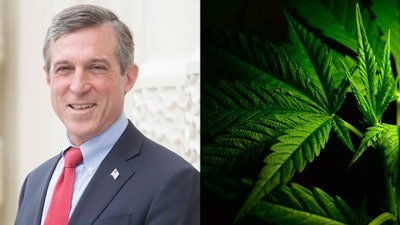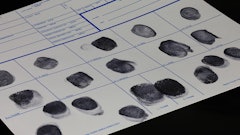
Adult-use cannabis legislation received three-fifths majority support in the Delaware General Assembly March 28, but Democratic Gov. John Carney’s office has been tight-lipped on the issue since.
Carney, who is term-limited and cannot seek reelection in November 2024, has yet to publicly act upon House Bill 1 and House Bill 2. The complementary bills aim to legalize the possession of up to 1 ounce of cannabis for personal use by adults 21 and older, and to set up a structure to regulate commercial cultivation and retail in the state.
When Cannabis Business Times reached out to Carney’s office April 11, Communications Director Emily Hershman said the governor has “no updates” on those bills. When asked if the governor plans to let the legislation become law without his signature, Hershman did not immediately respond and did not return a call to the governor’s office.
The Delaware Constitution provides 10 days (excluding Sundays) for the governor to act on legislation: either by signing or vetoing a bill. Any bill left unaddressed by the governor becomes law.
It has been 12 days (excluding Sundays) since the General Assembly passed H.B. 1 and H.B. 2, but it’s unclear exactly when that 10-day counter started ticking. Did the governor receive those bills right away? Was there a day or two when the bills sat in a clerk’s office? Neither the governor’s office nor the bills’ sponsor, Democratic Rep. Ed Osienski, has provided CBT clarity on that timeline.
Osienski did tell CBT that he will issue a press release April 14 related to the status of H.B. 1 and H.B. 2. “I have nothing more to add at this time,” he said.
The House passed H.B. 1 with a 68.3% majority March 7 and H.B. 2 with a 65.9% majority March 9, while the Senate approved the measures with 76.2% and 71.4% majorities March 28, sending them to Carney’s desk. Both bills remain listed as “ready for governor for action” on the Delaware General Assembly’s website.
Last year, Carney vetoed a former version of H.B. 1—to legalize simple possession—stating that he did not believe “promoting or expanding” the use of cannabis for those 21 and older was in the best interest of the state. He dismissed the potential upside of a licensed and regulated commercial adult-use program in this state of 1 million.
The governor’s recent silence on the cannabis legislation at his desk comes on the heels of more than 2,700 arrests for cannabis possession between 2018 and 2021 in Delaware, according to NORML.
As the General Assembly finalized language for H.B. 1 and H.B. 2 last month, Carney cited roadway safety concerns, notably the absence of a “sobriety test” for impaired drivers, as well as “unintended consequences” as reasons for his reluctance to sign adult-use cannabis legislation, CBS affiliate WBOC reported.
This reluctance comes at a time when 72% of registered Delaware voters support legalizing the use of cannabis, including 88% of Democrats, according to Civiqs polling.
Both pieces of legislation are sponsored by Osienski, who also led last year’s unsuccessful charge for reform.
“It’s been a long journey,” Osienski said on social media March 28, following the Senate’s passage of both bills. “We’ve had some ups and downs. But this is the day we have been waiting for. … I hope the governor follows the will of Delawareans and signs the bills into law or allows them to become law.”
Should H.B. 1 become law, the cannabis possession limits for adults 21 and older would be 1 ounce of dried flower, 12 grams of concentrate, or products with 750 grams or less of delta-9 THC, according to the bill. Also, “adult sharing,” meaning transferring cannabis products between persons who are 21 and older, will be allowed as long as no money, reciprocal transactions or contingencies are tied to the transfer.
Home cultivation and consuming cannabis in public would remain prohibited for all Delawareans.
Meanwhile, H.B. 2 would make Delaware the 22nd state to legalize a regulated and taxed cannabis marketplace in the U.S., including license types for cultivation facilities, retailers, product manufacturers and testing laboratories.
By 15 months after the effective date of the bill, a “marijuana commissioner,” appointed by the governor, would issue 60 cultivation licenses, one-third of which would be reserved for social equity applicants in each of two tiers. The licensing tiers would be defined by more or less than 2,500 square feet for indoor facilities or 1 acre for outdoor facilities, according to the bill. But no cultivation facility could exceed 12,500 square feet indoors or 7.5 acres outdoors.
By 16 months after the effective date, the commissioner would issue 30 manufacturing facility licenses, including 10 for social equity applicants and 10 for microbusinesses.
And by 19 months after the effective date, the commissioner would issue 30 retail licenses, 15 of which would be reserved for social equity applicants.
At retail, a 15% excise tax would be imposed on cannabis sales, according to the bill. Each month, 7% of the total tax revenue would go toward a Justice Reinvestment Fund to administer grants, contracts, services or initiatives that focus on any of the following:
- Restorative justice, jail diversion, workforce development, industry specific technical assistance or mentoring services for “economically disadvantaged” persons in disproportionately impacted areas;
- Addressing the underlying causes of crime, reducing drug-related arrests, and reducing the prison population in Delaware; or
- Creating or developing technology to assist with the restoration of civil rights and expungement of criminal records.
Local municipalities would maintain control over where and when cannabis businesses could operate in their jurisdictions, or to prohibit cannabis business operations altogether through the enactment of an ordinance or ballot measure, according to the bill.
Those regulations, and the entirety of H.B. 2’s language, depend on Carney’s executive pen (or his decision not to act).
Under current law, possessing more than 1 ounce of nonmedical cannabis is a misdemeanor punishable by up to three months in jail and a $575 fine. Possessing more than 175 grams, or roughly 6 ounces, is a felony offense.


























